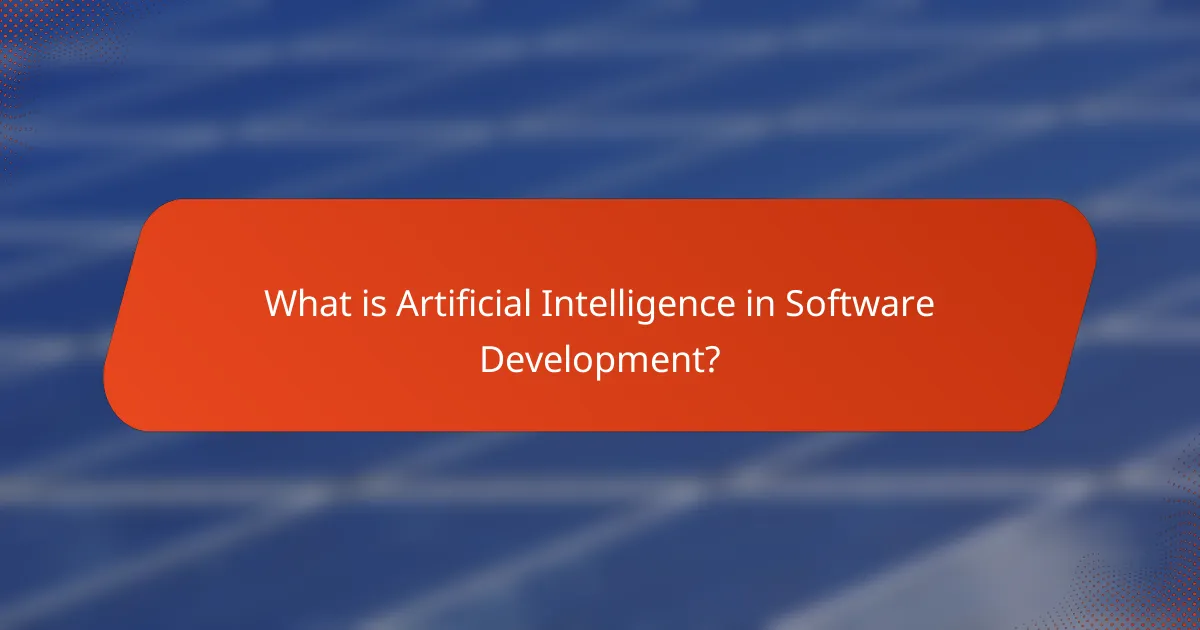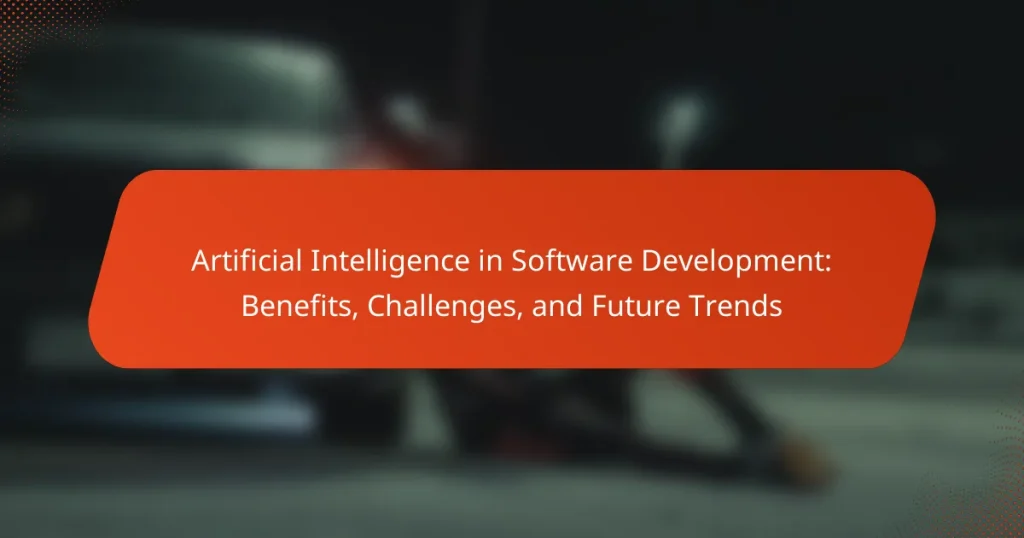Artificial Intelligence (AI) in software development encompasses the application of AI technologies to enhance the software creation process, including machine learning, natural language processing, and automation. These technologies improve coding efficiency, automate testing, and optimize project management by analyzing data to identify patterns and predict outcomes. Research indicates that AI can reduce development time by up to 30% and enhance software quality through better debugging and error detection. Future trends in AI for software development include increased automation of repetitive tasks, enhanced code generation tools, and improved testing processes, all contributing to a more efficient development landscape. The growing adoption of AI tools signifies a shift towards intelligent software development practices.

What is Artificial Intelligence in Software Development?
Artificial Intelligence in software development refers to the integration of AI technologies to enhance the software creation process. It includes techniques such as machine learning, natural language processing, and automation. These technologies enable developers to improve coding efficiency, automate testing, and optimize project management. AI tools can analyze vast amounts of data to identify patterns and predict outcomes, thereby streamlining development workflows. Research shows that AI can reduce development time by up to 30%. Additionally, AI-driven systems can assist in debugging and error detection, leading to higher software quality. Overall, AI is transforming how software is developed, making it faster and more efficient.
How does Artificial Intelligence enhance software development processes?
Artificial Intelligence enhances software development processes by automating repetitive tasks and improving code quality. AI tools can analyze code patterns and detect bugs more efficiently than manual methods. This leads to faster debugging and reduced development time. Additionally, AI can assist in generating code snippets based on specifications, which accelerates the coding phase. Machine learning algorithms can optimize project management by predicting timelines and resource needs. AI-driven analytics also provide insights into user behavior, allowing for better software design. According to a report by McKinsey, companies using AI in software development see a 20-30% increase in productivity.
What are the key technologies driving AI in software development?
Key technologies driving AI in software development include machine learning, natural language processing, and automated reasoning. Machine learning enables systems to learn from data and improve over time. Natural language processing allows software to understand and generate human language. Automated reasoning helps in solving problems and making decisions based on logical inference. These technologies enhance code generation, debugging, and software testing processes. For instance, tools like GitHub Copilot utilize machine learning for code suggestions. According to a report by McKinsey, AI can increase productivity in software development by up to 40%.
How do AI algorithms contribute to software quality?
AI algorithms enhance software quality by automating testing and improving code analysis. They identify bugs and vulnerabilities more efficiently than manual methods. Machine learning models can learn from historical data to predict potential issues. This predictive capability allows for proactive measures in software development. AI algorithms also facilitate continuous integration and deployment processes. They ensure that code changes do not introduce new defects. According to a study by McKinsey, companies using AI in software development report a 30% reduction in defects. This statistic underscores the significant impact of AI on software quality.
What are the main benefits of using Artificial Intelligence in software development?
The main benefits of using Artificial Intelligence in software development include increased efficiency, improved accuracy, and enhanced decision-making. AI automates repetitive tasks, allowing developers to focus on complex problems. This leads to faster development cycles and reduced time-to-market. AI algorithms also minimize human errors, increasing the reliability of the software. Enhanced data analysis capabilities enable better insights for decision-making. According to a report by McKinsey, companies using AI in software development can see productivity improvements of up to 40%. These benefits collectively contribute to more innovative and competitive software solutions.
How does AI improve efficiency in software development?
AI improves efficiency in software development by automating repetitive tasks and enhancing decision-making. It streamlines coding processes through tools like code generation and automated testing. AI-driven analytics help identify bugs and performance issues faster. This reduces the time spent on debugging and increases overall productivity. According to a study by McKinsey, teams using AI tools can improve their productivity by up to 30%. Additionally, AI facilitates better project management by predicting project timelines and resource needs. This leads to more accurate planning and allocation of resources. Overall, AI significantly accelerates the software development lifecycle, making it more efficient.
What role does AI play in reducing development costs?
AI significantly reduces development costs by automating repetitive tasks and streamlining workflows. It enables faster coding through intelligent code suggestions, which decreases the time developers spend on writing and debugging. AI tools can predict project risks, allowing teams to address issues early and avoid costly delays. Additionally, AI enhances testing processes through automated testing, which reduces the need for extensive manual testing. According to a report by McKinsey, organizations that leverage AI in development can reduce costs by up to 30%. This efficiency leads to lower labor costs and faster time-to-market for software products.
What challenges are associated with implementing Artificial Intelligence in software development?
Implementing Artificial Intelligence in software development presents several challenges. These challenges include data quality issues, which can lead to inaccurate AI models. Insufficient training data can hinder the model’s ability to learn effectively. Integration with existing systems often proves complex and time-consuming. There may also be a lack of skilled personnel who understand both AI and software development. Additionally, ethical considerations, such as bias in AI algorithms, pose significant concerns. Compliance with regulations regarding data privacy adds another layer of complexity. Finally, the high costs associated with AI implementation can be a barrier for many organizations.
What are the common obstacles faced during AI integration?
Common obstacles faced during AI integration include data quality issues, lack of skilled personnel, and resistance to change. Data quality issues arise when datasets are incomplete or biased. Poor data can lead to inaccurate AI predictions. The lack of skilled personnel is a significant barrier. Organizations often struggle to find qualified data scientists and AI specialists. Resistance to change is another critical obstacle. Employees may fear job displacement or be reluctant to adopt new technologies. These challenges can hinder the successful implementation of AI solutions in software development.
How can data privacy issues impact AI in software development?
Data privacy issues can significantly impact AI in software development. These concerns can lead to stricter regulations and compliance requirements. For instance, the General Data Protection Regulation (GDPR) mandates that organizations protect user data. Failure to comply can result in hefty fines and legal repercussions. Additionally, data privacy issues can hinder the availability of training data. AI models require vast amounts of data to learn effectively. If data is restricted due to privacy concerns, model performance may suffer. Furthermore, companies may face reputational damage if they mishandle user data. This can lead to a loss of trust among users and stakeholders. Ultimately, addressing data privacy is crucial for the successful integration of AI in software development.

What are the future trends of Artificial Intelligence in Software Development?
Future trends of Artificial Intelligence in software development include increased automation, enhanced code generation, and improved testing processes. Automation will streamline repetitive tasks, allowing developers to focus on complex problems. Enhanced code generation tools will leverage AI to produce code snippets, reducing development time. AI-driven testing will improve software quality by identifying bugs more efficiently. Additionally, natural language processing will enable developers to write code using conversational commands. The integration of machine learning will facilitate predictive analytics, helping teams make data-driven decisions. These trends are supported by the growing adoption of AI tools across the industry, reflecting a shift towards more intelligent software development practices.
How is AI expected to evolve in the software development landscape?
AI is expected to evolve in the software development landscape by enhancing automation and improving code quality. Advanced algorithms will enable AI to assist developers in writing, testing, and debugging code. Machine learning models will analyze vast datasets to identify patterns and predict potential issues before they arise. This evolution will lead to faster development cycles and reduced costs. AI tools will increasingly integrate with development environments, providing real-time feedback and suggestions. According to a report by Gartner, by 2025, 70% of new applications developed by enterprises will use AI. This indicates a significant shift in how software is created and maintained. As AI continues to learn from user interactions, its ability to streamline processes will only improve.
What emerging technologies could shape the future of AI in software development?
Emerging technologies that could shape the future of AI in software development include quantum computing, edge computing, and advanced machine learning algorithms. Quantum computing enhances processing power, allowing AI to solve complex problems more efficiently. Edge computing enables data processing closer to the source, reducing latency and improving real-time decision-making for AI applications. Advanced machine learning algorithms, such as reinforcement learning and generative adversarial networks, enable more sophisticated AI models. These technologies collectively enhance AI’s capabilities, making software development more efficient and innovative.
How will the role of developers change with advancements in AI?
The role of developers will evolve significantly with advancements in AI. Developers will increasingly focus on higher-level tasks rather than routine coding. AI tools will automate repetitive coding and testing processes. This shift allows developers to concentrate on design and architecture. Collaboration with AI systems will enhance productivity and efficiency. Developers will need to acquire new skills in AI and machine learning. Continuous learning will become essential to keep up with technological changes. According to a report by McKinsey, 70% of companies are adopting AI to improve productivity, indicating a strong trend in the industry.
What industries are likely to be transformed by AI in software development?
The industries likely to be transformed by AI in software development include healthcare, finance, retail, and manufacturing. In healthcare, AI can enhance diagnostics and patient management systems. Financial services benefit from AI through automated trading and fraud detection. Retail leverages AI for personalized shopping experiences and inventory management. Manufacturing sees improvements in predictive maintenance and supply chain optimization. According to a report by McKinsey, AI could potentially create $3.5 trillion to $5.8 trillion in value across these sectors. This demonstrates the significant impact AI is poised to have on software development within these industries.
Which sectors are adopting AI-driven software solutions at a rapid pace?
The sectors adopting AI-driven software solutions at a rapid pace include healthcare, finance, retail, and manufacturing. In healthcare, AI is utilized for diagnostics, patient management, and personalized treatment plans. The finance sector employs AI for fraud detection, algorithmic trading, and risk assessment. Retail companies leverage AI for inventory management, customer service, and personalized marketing strategies. Manufacturing integrates AI for predictive maintenance, quality control, and supply chain optimization. According to a 2022 McKinsey report, 50% of organizations in these sectors have accelerated their AI adoption due to efficiency and competitive advantage.
How will AI influence the development of applications in various industries?
AI will significantly influence the development of applications across various industries. It enhances automation, allowing for faster development cycles. AI-driven tools can analyze user data to tailor applications more effectively. Machine learning algorithms improve application performance by predicting user behavior. Natural language processing enables more intuitive user interfaces. In healthcare, AI applications assist in diagnostics and patient management. In finance, AI algorithms detect fraud and optimize trading strategies. The manufacturing sector benefits from AI in predictive maintenance and supply chain optimization. Overall, AI’s integration streamlines processes and improves decision-making across industries.
What best practices should be followed when integrating AI in software development?
Best practices for integrating AI in software development include defining clear objectives and use cases. This ensures that the AI implementation aligns with business goals. It is essential to select the right tools and frameworks that fit the project requirements. Collaborating with domain experts enhances the relevance and accuracy of AI models. Continuous testing and validation of AI models are crucial to maintain performance. Ensuring data quality and ethical considerations is necessary to avoid biases. Establishing a feedback loop allows for iterative improvements in AI systems. Proper documentation of AI processes aids in knowledge transfer and maintenance. Following these practices can lead to more effective AI integration in software development.
How can teams ensure successful AI implementation in their projects?
Teams can ensure successful AI implementation in their projects by establishing clear objectives and aligning them with business goals. This alignment helps in defining the scope and expected outcomes of the AI project. Next, teams should invest in the right technology and tools that suit their specific needs. This includes selecting appropriate AI frameworks and platforms that enhance productivity.
Additionally, fostering a culture of collaboration among team members is crucial. Collaboration encourages knowledge sharing and innovation, which are essential for AI projects. Teams should also prioritize data quality and accessibility. High-quality data is critical for training AI models effectively.
Regular training and upskilling of team members on AI technologies can further enhance implementation success. Continuous education ensures that the team stays updated with the latest trends and best practices in AI. Finally, conducting regular evaluations and iterations of the AI system ensures it meets the intended goals and adapts to changing requirements.
What strategies can be employed to overcome challenges in AI adoption?
Organizations can employ several strategies to overcome challenges in AI adoption. First, they should invest in employee training. This enhances skills and builds confidence in using AI tools. Second, fostering a culture of innovation is crucial. Encouraging experimentation allows teams to explore AI applications without fear of failure. Third, establishing clear goals for AI initiatives helps align efforts. Defining success metrics provides direction and accountability. Fourth, collaborating with AI experts can bridge knowledge gaps. Partnerships with technology firms can provide access to resources and insights. Lastly, addressing ethical concerns early builds trust. Transparent communication about AI’s impact fosters acceptance among stakeholders. These strategies are supported by industry reports indicating that organizations with structured approaches see higher success rates in AI projects.
Artificial Intelligence in Software Development refers to the application of AI technologies to improve the software creation process, enhancing efficiency, accuracy, and decision-making. Key benefits include reduced development time, improved code quality, and cost savings, with AI tools automating tasks such as coding, testing, and project management. However, challenges such as data quality issues, a lack of skilled personnel, and ethical considerations must be addressed for successful integration. The article also explores future trends in AI, including increased automation and the evolution of developer roles, highlighting the transformative impact of AI across various industries.




